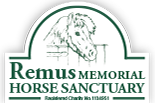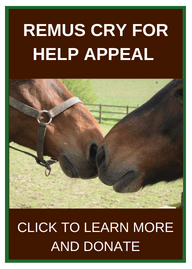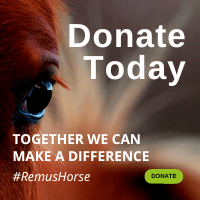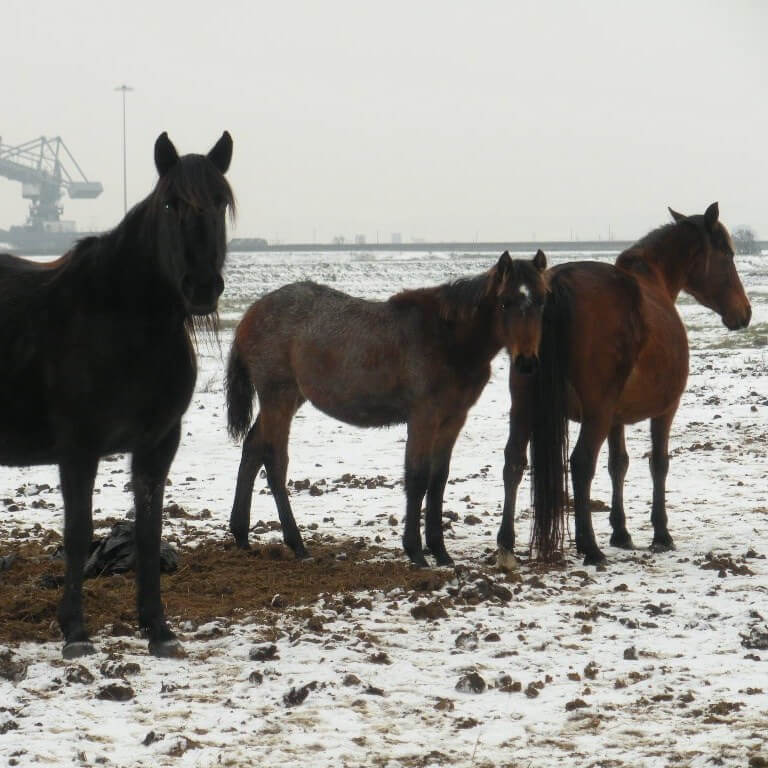
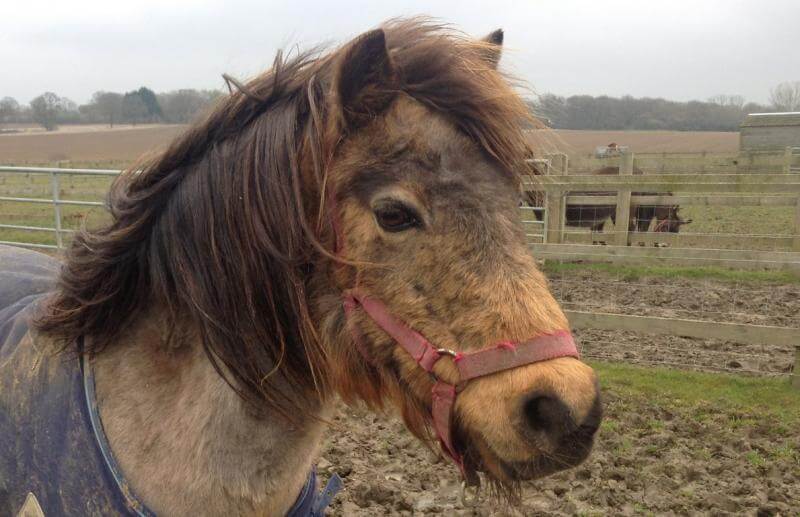

Horse Dehydration in Winter
Looking after horses takes so much care – something the team at Remus Horse Sanctuary is well aware of! And some things that we may think of as seasonal issues aren’t actually season-specific at all.
That’s the case with dehydration – yes of course we all know to keep an eye on the animals we care for when it’s hot and sunny, but did you know dehydration can be a risk during the winter months as well?
Being in the stable more, not liking cold water or being unable to access water that has frozen can all lead to dehydration at this time of year. And that in turn can have severe consequences – a common result is impaction colic – or even death.
It’s easily avoided though. Ensure there’s always clean, fresh water available and check that troughs are not frozen. Remember that if most food is hay rather than grass, your horse will need more water than normal, as they are not absorbing any from their food intake.
You can also try adding water to feed, offer lukewarm rather than cold water and even flavour water to make it appealing – apple juice, molasses or mint are popular.
For more ideas check out this excellent Horse and Hound feature at www.yourhorse.co.uk/horse-care/vet-advice/whydehydration.
If you’ve not already done so, please consider contributing to our Winter Hay Appeal.
The True Cost of Horse Ownership
Keeping a horse is not a cheap hobby – and with the cost of living crisis, the expense of horse ownership has never been more keenly discussed.
At Remus we sadly often see the results when owners cannot afford to keep horses properly – whether they come to us because corners have been cut in their health and welfare, or whether owners are looking to rehome because they can no longer afford to keep their horses amid rising bills or a change in personal circumstances.
That’s why we make it part of our mission to educate would-be owners on the true costs of the hobby. Along with the actual purchase cost of your animal, there are insurance premiums to be paid, vets bills, feed, hay and livery if you don’t have your own place to keep your horse. That’s before you add in the cost of tack and other kit, transport and lessons.
The excellent Horse and Hound feature at www.horseandhound.co.uk/features/10-ways-save-money-livery-bill-431963 lists some ways to help keep costs down, including sharing costs with other owners, selling unwanted tack, taking on jobs at the livery yard, and sharing rarely needed kit and transport costs.
It’s important to note that none of these ideas sacrifice the quality of care and welfare for your animal – a concern that should always be uppermost in owners’ minds.
If you are paying for livery, although cost will be a major consideration, you should also ensure that corners are not being cut to get that good deal. Find out more about the true cost of livery at www.horseandhound.co.uk/news/why-owners-and-livery-yards-must-appreciate-the-true-cost-of-keeping-horses.
This year Remus is celebrating its 40th anniversary. If you’ve not yet done so, please take a look at our 40th Anniversary Challenge and share with your friends and family to help us achieve our mission.
Does your Horse need that Rug?
As horse owners, when we feel that chill in the air, our natural reaction is to pop a rug on our horse, but a scientist believes we’ve got it wrong…
It’s almost Spring yet there’s a distinct chill in the air and many of us have been experiencing snow. When we need to pop on that extra thick jacket in the morning, we think our horses must be feeling the cold too, but according to scientist Dr David Marlin we need to alter the way we think.
According to Dr Marlin, it’s thermoregulation that is the key. We all know that if we’re too hot we sweat, too cold and we start to shiver. The same apparently applies to horses.
However, the difference is that larger animals are able to retain heat far better than smaller ones – humans feel cold once the temperature dips below 25 degrees C. However, a horse doesn’t feel the cold until it’s a chilly 5 degrees C. Dr Marlin reminds us that a horse with a natural coat is wearing the equivalent of a 4 Tog duvet! However, clipped horses may feel colder sooner – and at Remus Horse Sanctuary we have a number of animals who are elderly or have health problems, who also need to be treated differently.
If you’d like to learn more about the science behind Dr Marlin’s research, click on the link to read the article: www.yourhorse.co.uk/horse-care/thermoneutral-zone.
Winter Feeding for a Calm and Healthy Horse
Winter isn’t without its challenges, and this includes keeping your horse healthy, happy and looking their best. Inevitably shorter days and dismal weather can mean reduced turnout, irregular exercise and less hacking opportunities to blow the cobwebs away. Feeding plenty of forage to keep the horse occupied when stabled for longer also means keeping an eye on your horse’s waistline.
Fibre and oil for a calm ride
For a calmer ride research has shown that feeding sources of slow-release energy from fibre and oil is key. Using a feed that supplies an appropriate amount of energy for a reduced workload will not only help with a calmer ride but also help to keep the waistline in check as well.
Dengie Hi-Fi Molasses Free combines chopped and pelleted alfalfa and straw with a light rapeseed oil coating, mint, and fenugreek for added tastiness. Hi-Fi Molasses Free contains very low levels of energy, sugar and starch making it ideal for horses at rest or in light work that need to watch their weight or can be excitable. Simply combine with vitamins and minerals to balance the ration.
Maintaining skin, coat and hoof condition
UK pasture and forage typically lacks the trace minerals copper, selenium and zinc and conserved forage also lacks vitamin E. Ensuring a balanced ration and adding some extra beneficial nutrients such as biotin can help with the environmental challenges to your horse’s skin, coat and hooves in the winter.
Healthy Hooves Molasses Free combines chopped and pelleted alfalfa and straw with a light rapeseed oil coating, vitamins, minerals, garlic and MSM. Healthy Hooves Molasses Free provides a balanced ration when fed at the recommended quantity and includes biotin at the level found in a hoof supplement. MSM, which is a bio-available source of sulphur, is also included as it is a key component of keratin for joint support as well as good hoof, coat and skin condition. Grass is the natural source of sulphur for horses and those on restricted grazing may benefit.
Managing weight and digestive health
We all know that trickle feeding is vital for digestive and behavioural health but in the domestic environment ad-lib forage feeding can often result in obesity. Choosing low calorie fibre sources is key for weight management and keeping the horse chewing.
New Dengie Ulser Lite combines oat straw with dried grasses, grass and alfalfa pellets with a light rapeseed oil coating, ADM Protexin in-feed formula, that combines prebiotic and live yeast, and herbal blend. At 8MJ/kg Digestible Energy Ulser Lite is a low-calorie fibre feed to support digestive health that can also be used to partially or totally replace the forage ration making it an ideal alternative when only more calorific forage like haylage is available.
Straw – a low calorie fibre source
Winter weight loss in good do-ers or overweight horses is a vital step to getting them to or keeping them at a healthy weight long term. In the UK our conserved forages such as hay and haylage can be too calorific when fed ad-lib and straw as a lower calorie fibre can be very useful to mix in the forage ration to keep a horse chewing without the calories. Some people are nervous regarding straw use, but research using straw to replace 50% of the haylage ration found no detrimental effects on digestive health. Furthermore, it helped to slow the overall rate of intake of the total forage ration which in turn lessened insulin response which is good news for those with insulin dysregulation.
Discover more at www.dengie.com.
Managing the Flu Vaccine Shortage
The shortage of equine flu vaccine across Europe looks set to continue into October, according to the British Equine Veterinary Association (BEVA).
This is obviously a great concern for horse owners – not least at Remus Horse Sanctuary, where many of our residents are more vulnerable due to their condition and sometimes unknown vaccination status.
However, the British Equine Veterinary Association (BEVA) has offered some guidance for horse owners, depending on their risk level.
Those horses most at risk are adult horses that mix regularly with other horses, and young horses under the age of four who have an incomplete vaccination history.
BEVA recommends that if your horse is in a low risk category – fully vaccinated and not mixing with others – you could defer the vaccination by up to three months, in consultation with your vet of course, ensuring that you follow up with a booster within nine months. Your vet must update the horse’s passport with the relevant information.
If your horse competes under the British Horse Society (including British Riding Clubs), the Pony Club, Riding for the Disabled Association, Association of British Riding Schools and The Showing Council they will still be allowed to enter competitions if you defer for three months and then get the nine-month booster. Again, vets must mark and sign passports documenting the delay.
Other competition organisations have put in place a temporary exemption on the requirement for boosters within six months of a competition.
You can find full details of risk categories and exemptions for competitions at: www.yourhorse.co.uk/news/eqine-flu-vaccine-shortage-advice
The Problems with Grass Grazing
We are now into winter after a very good summer for grass growth. That means it’s time to put some of the horses and ponies back to their original fields after being kept in on limited grazing for the last 6 months.
This is always a very exciting affair for both us and them to enjoy. Being cooped up this long is unusual given the good weather we have enjoyed this year – good for the grass to grow at least. It was wet and warm for long periods, which is ideal for the fields.
Unfortunately for a lot of our individuals, this flush of grass brings about laminitis, a serious health concern which can ultimately, if left unmanaged, lead to severe pain and even death
Laminitis is defined as ‘Inflammation of the laminae of the hooves causing lameness, often severe’. This inflammation is caused by the increased sugar levels in the grass which some individuals’ bodies can’t deal with. It therefore becomes damaging in the bloodstream, especially around the pedal bone in the foot, which in severe cases can rotate and penetrate downwards through the hoof at the bottom.
To avoid these problems during the spring months when the grass becomes very lush and high in sugar, we take all of our problem horses off these pastures and move them to areas of poor grass growth or bare paddocks that are coated with woodchip. We then carefully control their diet with hay to supplement the grazing they are losing and monitor them closely over the next few months.
Find out more about laminitis and visit our website for some winter advice for you and your animals when coping with snow, frost and ice.
If you’re able to help with a donation for our running costs during these difficult winter months, please visit: www.remussanctuary.org/donate
Winter Coughs and What to Look Out For
Winter often brings with it its fair share of coughs and colds, even without an international pandemic! But it’s not just the NHS under pressure. Studies have shown that the cold air and dark nights also have an impact on the health of our four-legged friends. With an increased risk of horses developing respiratory issues throughout the winter months, there are a few things you can do to help ward-off coughs and act quickly if more significant problems occur.
Environment is a huge factor. Whilst it might be tempting to warm up the stable and create a cosy sanctuary, ventilation is key! Increasing turnout time and ensuring good air circulation in your stable can counteract the effects of altered air hygiene, caused by the winter months. Low-level feeding and soaking or steaming your feed are also great ways of preventing dust and spore inhalation.
But a dust-aggravated cough is different from a virus. In fact, there are four different causes of equine respiratory issues: fungus spores, allergens and contaminants, bacteria, and viruses. Often, the increased time indoors gives infections the opportunity to spread around the yard. If you suspect your horse might be affected by something more than dust inhalation, you should cease ridden exercise, increase turnout, and contact your vet immediately. Your vet will be able to conduct a number of tests to help diagnose the issue.
You can read more about the causes of equine coughs, and what to do if your horse has symptoms on this Horse and Rider article here.
Our online shop has a number of new items for Christmas 2021 including, of course our new wall calendar for 2022 which features unique images of our animals throughout the 12 months. Visit our online shop.
Turn up the Turnout
With the long nights drawing in, and a sudden shift to the colder weather, it’s easy to see how we might be tempted to reduce turnout time for our beloved horses and ponies – particularly in favour of a warm and cosy stable! But a recent study has shown that longer turnout could actually reduce the risk of equine injury.
The benefits of turnout have long been recognised. Not only does the constant roaming contribute to good health and fitness, excellent circulation, and reduce the risk of Colic, but the companionship associated with being outdoors and part of a herd is said to prevent boredom and reduce stress-related behaviour.
Our Remus residents spend much of their days wandering the pastures with their pals, as well as being supported by our environmental enrichment programme. We have always recognised the importance of providing our horses with the opportunity to behave as naturally as possible.
But now a six-year study from Centenary University Equestrian Center in New Jersey, has shown that horses turned-out for more than 12 hours per day, had a massive 25% lower instance of soft tissue injuries. The research across 146 non-elite performance horses was inspired by the lead researcher’s own veterinary practice observations. Jesslyn Bryk-Lucy noticed that horses who had a more natural, outdoor lifestyle seemed to require less veterinary care.
Scientists believe there could be a number of reasons behind the findings of this research. Horses may have benefited from increased conditioning of the tendons and ligaments from simply being in a more natural environment, or it could be related to change in behaviour caused by longer turnout.
There is undoubtedly further research to be done in this area, but this study goes one step further in demonstrating that horses are happiest and healthiest outdoors!
You can read more about the findings on Horse & Hound here.
As you can imagine, our costs for the animals increase significantly during the winter. If you are able to make a donation or perhaps purchase a treat for one of them, it would be massively appreciated!
Winter is here: let’s get ready for spring!
As we find ourselves in another Lockdown here in England, you’ll probably have noticed all the attention has swiftly turned back to exercise and keeping fit! Cue the return of Joe Wicks, online yoga and home gyms being dusted off once again. One key difference between the last lockdown and this one is the unlimited exercise allowed outdoors.
While some restrictions remain on what we can do with our horses, this is also the time of year that experts warn about spring obesity. It may seem a long way off, but we’ll be back to too much grass in no time. What we do now to keep our horses in good shape throughout winter will help them to go into spring at a healthy weight.
One of these actions is, of course, regular exercise, but for those non-ridden and retired equines just like ours here at Remus, sensible feeding is also very important to help them shed any unnecessary pounds.
A recent article in Horse & Hound outlines some important points; from understanding that winter grass does still contain calories and should be rationed if appropriate, to soaking hay to reduce sugar content.
Winter is tough for everyone but making small tweaks to your horse’s routine and management will help him stay safe and healthy into the new year.
Read Horse & Hound’s article in full here.
If you’d like to help with our animals food over winter, please visit our online shop or make a donation.
Keeping our horses and ponies safe this winter
The New Year generally brings colder weather and, as well as giving top class care to our Sanctuary residents, there are many more horses and ponies out there who are not so lucky and who we also need to keep an eye on.
The horse welfare crisis in the UK has been escalating for many years and our countrywide Welfare Watch aims to deliver assistance to horses in crisis in and around Essex and the South East of England. At this time of year, we struggle to respond to all of the reports we receive from members of the public; we just cannot physically be everywhere we are needed – and it comes at great cost! Will you donate to our Winter Feed Appeal?
We’ve put together this simple five-step checklist, designed for everyone to refer to before contacting us, so that we can all work together to help more horses and ponies at this time of year. Why not print a copy and save it to hand?
- Keep safe yourself. This is the most important thing: first of all, horses can be unpredictable and so you must always put your own safety first, secondly if you don’t know the owner of the land, you could be trespassing.
- Make yourself aware of the Five Freedoms (see below) to help you decide the nature of the problem.
- Collect information about the horse(s) you are concerned about and fill in our online form. The form will ask you for:
- The nature of the problem in line with the Five Freedoms
- Supporting photographs, if possible, to demonstrate the nature and scale of the problem and so that we can prioritise the visits
- Horse(s) details including how many, gender, breed, colour and age (if known) and also horse(s) owner’s details, if known
- The landowner’s details, if known
- The location of the horses
- Your contact details
- If it is an emergency situation, contact the RSPCA immediately on 0300 1234 999.
- If it is safe to do so, take the horse(s) some hay and water until further help is sought.
The Five Freedoms
There are many reasons why a horse may be distressed or need assistance. We’ve chosen to align our Welfare Watch with the ‘Five Freedoms’ identified by The Animal Welfare Act 2006, which enshrines the animal owner’s ‘Duty of Care’ in British Law:
- Freedom from hunger or thirst – the animal has little or no access to fresh water and/or food.
- Freedom from discomfort – the animal does not have somewhere to lie down or gain shelter or is exposed to extreme weather conditions.
- Freedom from pain, injury or disease – the animal clearly shows disease, an untreated injury or perhaps severely overgrown hooves.
- Freedom to express (most) normal behaviour – the animal is tethered incorrectly and/or does not have sufficient space or proper facilities and living conditions.
- Freedom from fear and distress – abandoned animals, those subject to dog attacks, low flying aircraft, or similar, or those suffering from any of the above.
Remember, it is really important that you send us photographs of the horses, ponies or donkeys in need so that we can prioritise our visits and their care.
Download the form here.
